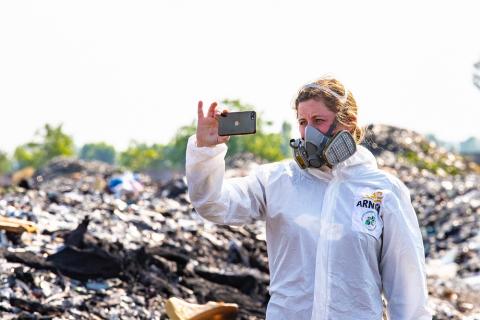A more inclusive movement for a healthier environment

by Nikola Jelinek
It has only been a few years since I graduated from college with a degree in Chemistry and Environmental Science. Recently, there have been more female graduates at my university, and shortly after graduation, I began working for the NGO Arnika, transitioning from a predominantly female academic environment to an NGO that also has many women on staff.
Arnika, located in the Czech Republic, has been a safe space for me since the beginning. During my early days at Arnika, I had the opportunity to travel to Armenia to present local findings on heavy metal contamination in various matrices, including human bodies, to the local communities. Our hair and urine samples were primarily from women. One of the challenges I and my (even younger) female colleague faced was effectively communicating information that was particularly relevant to women in a male-dominated environment. But this information was crucial for the health and well-being of the whole community, especially in Armenia.
Arnika addresses both local chemical-related issues and global problems that can be addressed through international conventions. After an article on crossing the “planetary boundary” of chemical pollution was published, I visited Geneva, Switzerland for the first time to attend the Basel, Rotterdam, and Stockholm Conventions (BRS COPs). By that time, I had already gained significant experience presenting research results that I had collaborated on or conducted at international conferences. I joined a diverse team with the aim of implementing systematic change.
The conference days were busy, but the collaborative and supportive environment overshadowed the workload. For several days, I encountered delegates from all over the world in the corridors and halls. However, the lack of diversity among the national delegates, mostly men who make up the majority of participants, highlights the persistent gender gap within the halls where crucial global issues are deliberated. The preponderance of male delegates reflects a broader trend in many spheres, underscoring the ongoing need for diversification and inclusivity.
I am concerned about the representation of women and their issues related to the chemicals being discussed at the BRS COPs. It is concerning that a limited number of women attend the BRS COPs and face gender barriers when expressing their opinions. As a 29 year-old woman in this environment, I not only encounter technical challenges associated with working at the global level but also personal obstacles related to being a young woman in a male-dominated field. Speaking in front of a full audience, whether in a plenary session or working groups, is particularly challenging for me as a young woman. However, when I do contribute, I feel doubly victorious - I am strengthening the named conventions and triumphing over the preponderance of older men who listen to my speech. I hope that all women's contributions pave the way for a more inclusive, equitable, and diverse landscape within these global conversations.
Nikola Jelinek (she/her) graduated from the Faculty of Environmental Technology at the University of Chemical Technology in Prague. At Arnika, she works as an expert on environmental sampling and toxic substances in the environment. She is involved in Czech and international projects. Previously, she worked as a laboratory technician-specialist in a private laboratory and as a laboratory technician at the Czech University of Agriculture in Prague and participated in the implementation of a number of research projects.
